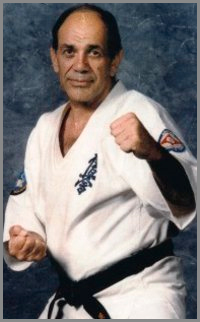Biographies
Steve Arneil
 Hanshi Steve Arneil was born in South Africa in 1934. When he was just 17 he became a black belt in Judo and was also training Kenpo and Karate. Wanting to pursue his martial arts training further he travelled to the birth place of Karate, Japan, in 1962 to study under Kancho Mas Oyama. By the time he left Japan in 1965, he had achieved the rank of 3rd dan and had been the first person to complete the 100 man kumite after Mas Oyama. While in Japan Hanshi Arneil met his wife. In order to allow him to marry a Japanese woman Hanshi Arneil was adopted by Mas Oyama.
Hanshi Steve Arneil was born in South Africa in 1934. When he was just 17 he became a black belt in Judo and was also training Kenpo and Karate. Wanting to pursue his martial arts training further he travelled to the birth place of Karate, Japan, in 1962 to study under Kancho Mas Oyama. By the time he left Japan in 1965, he had achieved the rank of 3rd dan and had been the first person to complete the 100 man kumite after Mas Oyama. While in Japan Hanshi Arneil met his wife. In order to allow him to marry a Japanese woman Hanshi Arneil was adopted by Mas Oyama.
After his marriage, Steve Arneil travelled with his new wife to Great Britain in 1965. In the same year, he and Shihan Bob Boulton founded the British Karate Kyokushinkai (BKK) organisation. The first full time dojo was located in Stratford, in East London. The number of clubs expanded ever since and today there are about 70 throughout Great Britain.
During the period between 1968 and 1976, Steve Arneil was the team manager and coach for the All Styles English and British Karate team which became the first non-Japanese team to win the World Karate Championship in 1975/76. In 1975 the French Karate Federation also awarded him the title of the "World's Best Coach".
In 1991, Steve Arneil and the BKK resigned their 25 year long membership with the Japan based International Karate Organisation (IKO) and founded the International Federation of Karate (IFK) which currently has a membership of over 100,000 in up to 19 different countries. He is the President of the BKK and head of the IFK.
His 8th dan was awarded to him, not by Japan or Mas Oyama and Kyokushin, but by the entire British karate community for his services to karate in Great Britain. On May 26th, 2001, Hanshi was awarded his 9th dan by the IFK Country Representatives at their meeting in Berlin.
Steve Arneil has written books on karate, including a book on kata and a book outlining the kihon techniques and sequences required by the IFK syllabus.




